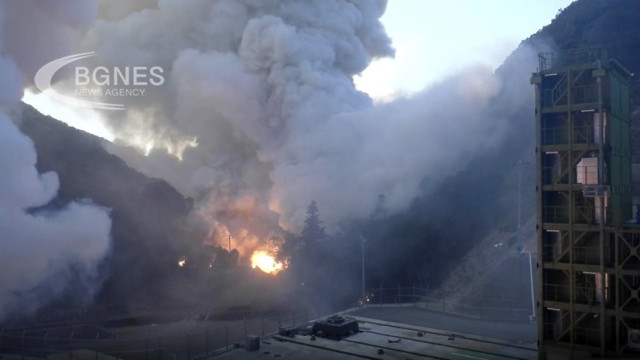A rocket manufactured by a Japanese company exploded seconds after liftoff, a spectacular failure for the company's attempt to put a satellite into orbit, AFP reports.
The 18-metre Kairos rocket of Tokyo-based Space One blasted off in the coastal region of Wakayama in western Japan carrying a small government test satellite.
But about 5 seconds later, the solid-fuel rocket exploded in a fire in which white smoke billowed across the remote mountainous region and orange flames blazed on the ground, live footage showed.
Space One said it had made the decision to "abort the flight" and that details were being investigated.
"We want to take this result with an eye toward the future and embark on our next challenge," company president Masakazu Toyoda said, assuring that Space One was not using the term "failure."
The firm wishes to "contribute to the expansion of space-related services" through successful satellite launches from its rockets in the future, he added.
Private companies like Space One are playing an increasingly important role in space exploration globally.
Last month, a Houston-based company landed the first American spacecraft on the moon in more than 50 years, and rockets made by Elon Musk's SpaceX have become the subject of a heavy reliance by NASA.
But failures are numerous and last year another Japanese start-up, ispace, tried in vain to become the first private company to land on the moon.
ispace reported that it had communication with its craft during what it described as a "hard landing."
Space One hopes to become the first private company in Japan to put a satellite into orbit.
The plan was for Kairos - an ancient Greek word meaning "the right moment" - to do so about 51 minutes after liftoff on March 13.
The launch has already been delayed five times due to parts shortages and other problems, most recently on March 9.
The mayor of Kushimoto, the area in Wakayama where the Space One launch site Spaceport Kii is located, expressed his surprise and disappointment.
"I never even imagined such a result," said Katsumasa Tashima shortly after the explosion.
The area and its 15,000 residents "will continue to support Space One. We want to continue to offer our help so that the first rocket can have a successful launch," he added.
Space One was established in 2018 by a team of major Japanese technology enterprises, including Canon Electronics, IHI Aerospace, construction firm Shimizu and the state-owned Development Bank of Japan.
The setback fuelled a sell-off in their shares, with Canon Electronics ending the day down 7.45%.
Last July, another Japanese rocket engine, the solid-fuel Epsilon S, exploded during a test about 50 seconds after liftoff.
It was one of a string of failures for the country's space agency JAXA, including attempts to launch the next-generation H3 rocket.
JAXA was eventually able to carry out a successful launch last month of H3, its new flagship rocket, which has been talked about as a rival to SpaceX's Falcon 9.
This followed the successful landing of an unmanned probe on the moon in January - albeit at an odd angle - making Japan only the fifth country to achieve a 'soft landing' on the lunar surface. / BGNES







